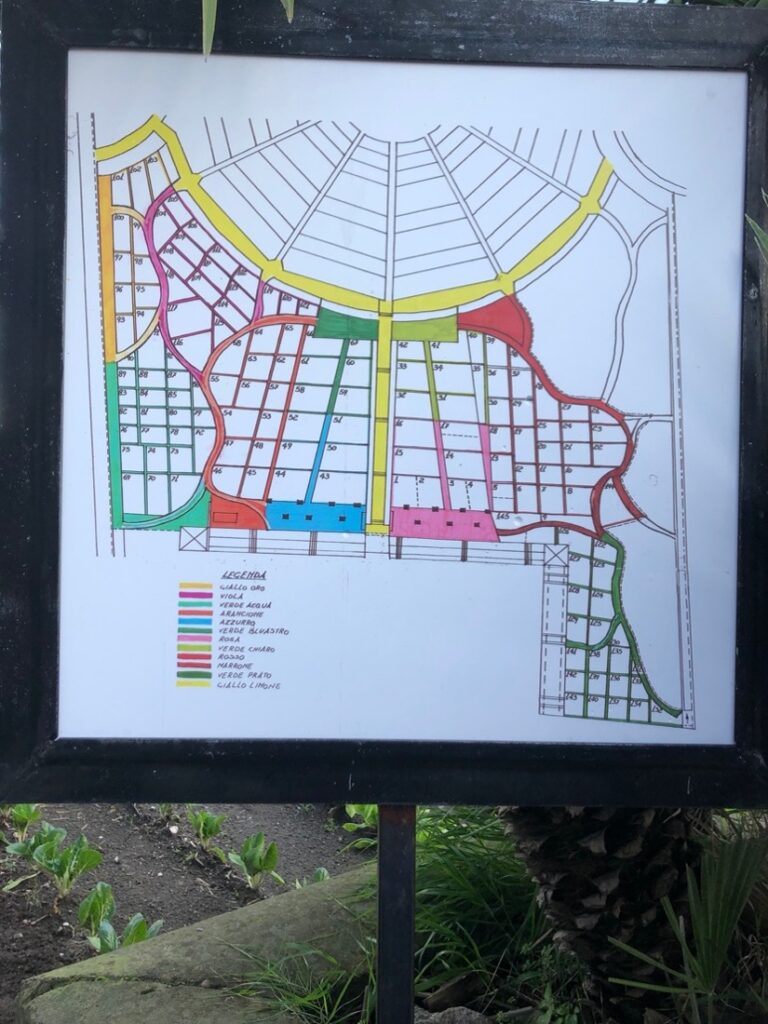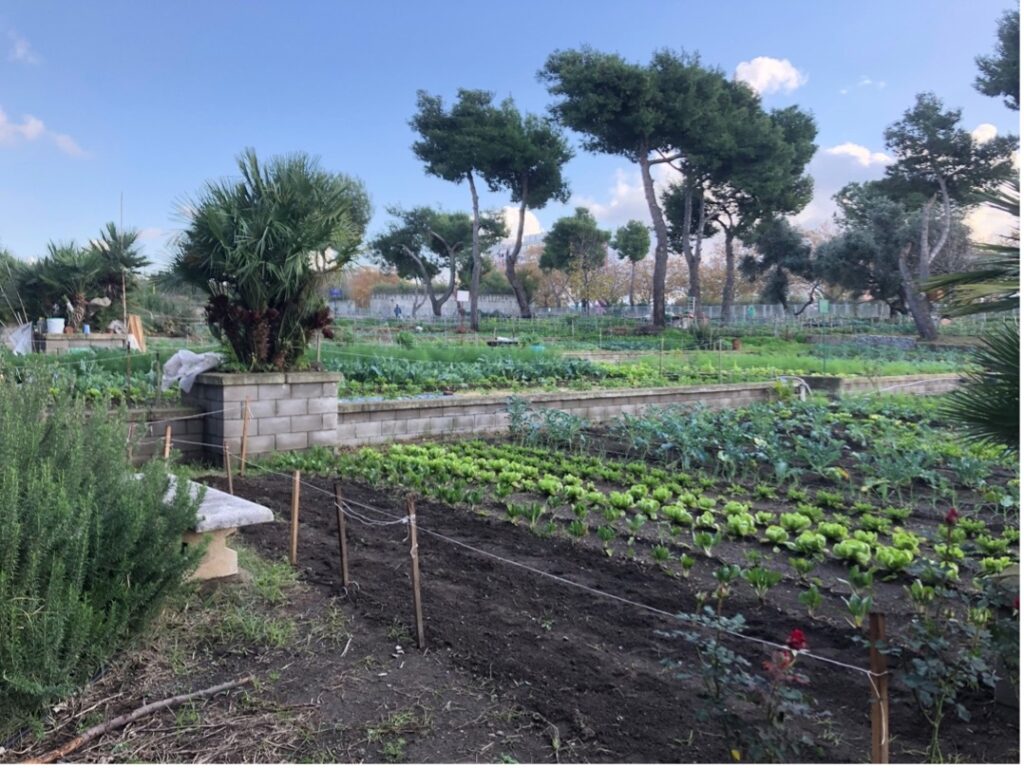By Angelina Grelle
Ponticelli is a district in the eastern outskirts of the metropolitan city of Naples. It is a complex neighborhood, mostly born after the ’80 earthquake, with an emergency plan. For this reason, it assumes a complex identity: It is a neighborhood with its historic centre, and its suburb recently built. This space’s conformation brings a different perception of the district between old and new habitants. Moreover, Ponticelli in the past had been a swampland that was reclaimed in the ‘700-‘800. Today in Ponticelli there are frequent floods that cause a lot of damage. Frequent flooding is caused, not only by the orographic conformation of the land but also by the numerous impermeable soils or soils that have lost their quality in terms of drainage due to waste abandonment and frequent fires. Furthermore, the neighborhood is at the mercy of organized crime.
Following the 1980 earthquake, Ponticelli was interested by a massive urban intervention that included the creation of a large park, dedicated to Fratelli de Filippo (De Filippo’s Brothers). It’s 122k square meters between paved area, green areas, playground, and artificial hills. After the construction, this park has been abandoned and vandalized. In 2015, an area inside the park was entrusted by the municipality to a center dedicated to the treatment and support for drug addicted people, part of the local public health office (Lilliput center, ASL Napoli 1) in collaboration with a social cooperative (ERA GESCO). The entrusted area was dedicated to the creation of urban gardens. Slowly the gardens have grown and from a few plots of land came in 2019 to 145 cultivated terraces with a waiting list of 200 people interested to be included in the project. Last year it expanded further, involving another 50 terraces in the central area of De Filippo Park. To take care of the gardens are associations, parishes, schools, but also ordinary citizens, from different social classes. The strength of the gardens of Ponticelli is not only that the project has recovered an abandoned area but also it has created a community in which people support and help each other.
From the environmental point of view, no pesticides are employed in the gardens. Biodiversity is respected by respecting the natural cycle of the seasons. The gardens today represent an example of sustainable environmental, social and economic development. Many initiatives take place in the gardens. Schools and associations often use the gardens as a venue for various events.

Figure 1– Urban gardens plan. Photo by the author.
The urban garden of Ponticelli can be considered an adaptation strategy if we look at the drainage system built in collaboration with the University Federico II of Naples, Department of Architecture. Through a network of canals and cisterns, that system helped to avoid any waste of water. On the other hand, the urban garden responds to the needs of mitigation as it reduces CO2 emissions, lowering the cost of transport by promoting the km0 consumption and reducing waste related to packaging. The urban garden of Ponticelli brings into play actions that address several objectives of the European Agenda such as: ensuring health and well-being, ending hunger, making cities inclusive and sustainable, ensuring sustainable consumption and production patterns, and ensuring peace justice.
Currently, gardens are facing a complicated period. Recently they have been increasingly vandalized: irrigation systems have been tampered with, trees uprooted, tools stolen, and crops ruined. Because of the socio-economic structure of the neighborhood small vandalism events have always occurred in the gardens, but recently these accidents have increased, to the point of requiring the intervention of public forces. The association Sepofà has become the spokesperson for these requests that hopefully will not go unheard. In a fragile neighborhood like Ponticelli, initiatives such as the social garden are often targeted by mafia. Clearly, when the most disadvantaged social classes are marginalized and their neighborhood transformed into a ghetto, they can easily be subjugated by criminal organizations, as they often become the only “presence” on the territory. For this reason, initiatives such as the social garden represent an alternative to show citizens that there are virtuous realities and a different way of life. It emphasizes how sometimes systems of injustice and inequity are not related to legal and “linear” dynamics, but rather, in certain contexts, are perpetrated by social and cultural conditions that arise from deep-seated social discomfort, leading those who most need change to be the first enemies of change. How does this cycle thicken? If it is true that climate change adaptation entails social transformations that contribute to more just and sustainable political, social, and economic systems, it is necessary that institutions support initiatives like communitarian gardens so they can thrive and play a key environmental and social role.

Figure 2- One of the terraces. We can see how well these are cared for and maintained.
Photo by the author.
This system is replicable elsewhere. There are numerous examples of urban gardens around the world that take their cue from the most distinct initiatives, some implemented from below as in the case of Ponticelli, but often also driven by institutional initiatives. Is there any certainty that these always work? No, as we have seen in the case of Ponticelli even when all goes well unexpected things can happen. This does not mean that it should not be an initiative supported and implemented, rather it means that we need more commitment from both institutions and citizens to protect these initiatives.
References
Alessandro Bottone on “Il Mattino”, (18 giugno 2021) ‘Ponticelli altre 50 terrazze nell’orto sociale’https://www.ilmattino.it/napoli/citta/ponticelli_altre_cinquanta_terrazze_nell_orto_sociale-6030459.html
Alessandro Bottone on “Il Mattino” (3 febbraio 2022) ‘Orto di Ponticelli, raccolta fondi per riparare ai danni dei vandali’ https://www.ilmattino.it/napoli/cronaca/orto_di_ponticelli_raccolta_fondi_riparare_danni_vandali_napoli-6481010.html
Jenkins, K. “Setting energy justice apart from the crowd: Lessons from environmental and climate justice.” Energy Research & Social Science, 39, 117–121. (2018). doi: 10.1016/j.erss.2017.11.015